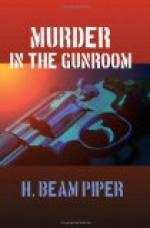“Mr. Fleming was an authority on antique firearms, and he was a manufacturer of foodstuffs,” Rand parried, carefully staying inside Goode’s Aristotelian system of categories and verbal identifications. “My own business does not occupy all my time, any more than his did, and I doubt if an interest in the history and development of deadly weapons is any more incongruous in a criminologist than in an industrialist. But if there’s any doubt in your mind as to my qualifications, you can check with Colonel Taylor, at the State Museum, or with the editor of the American Rifleman.”
“I see.” Goode nodded. “And as you point out, being a sort of non-professional expert, you should be free from mercenary bias.” He nodded again, taking off his glasses and polishing them on an outsize white handkerchief. “Frankly, now that I understand your purpose, Mr. Rand, I must say that I am quite glad that Mrs. Fleming took this step. I was perplexed about how to deal with that collection. I realized that it was worth a great deal of money, but I haven’t the vaguest idea how much, or how it could be sold to the best advantage.... At a rough guess, Mr. Rand, how much do you think it ought to bring?”
Rand shook his head. “I only saw it twice, the last time two years ago. Ask me that after I’ve spent a day or so going over it, and I’ll be able to give you an estimate. I will say this, though: It’s probably worth a lot more than the ten thousand dollars Arnold Rivers has offered for it.”
That produced an unexpected effect. Goode straightened in his chair, gobbling in surprised indignation.
“Arnold Rivers? Has he had the impudence to try to buy the collection?” he demanded. “Where did you hear that?”
“From Mrs. Fleming. I understand he made the offer to Fred Dunmore. That’s his business, isn’t it?”
“I believe the colloquial term is ‘racket,’” Goode said. “Why, that man is a notorious swindler! Mr. Rand, do you know that only a week before his death, Mr. Fleming instructed me to bring suit against him, and also to secure his indictment on criminal charges of fraud?”
“I didn’t know that, but I’m not surprised,” Rand answered. “What did he burn Fleming with?”
“Here; I’ll show you.” Goode rose from his seat and went to a rank of steel filing-cabinets behind the desk. In a moment, he was back, with a large manila envelope under his arm, and a huge pistol in either hand. “Here, Mr. Rand,” he chuckled. “We’ll just test your firearms knowledge. What do you make of these?”
Rand took the pistols and looked at them. They were wheel locks, apparently sixteenth-century South German; they were a good two feet in over-all length, with ball-pommels the size of oranges, and long steel belt-hooks. The stocks were so covered with ivory inlay that the wood showed only in tiny interstices; the metal-work was lavishly engraved and gold-inlaid. To the trigger-guards were attached tags marked Fleming vs. Rivers.




